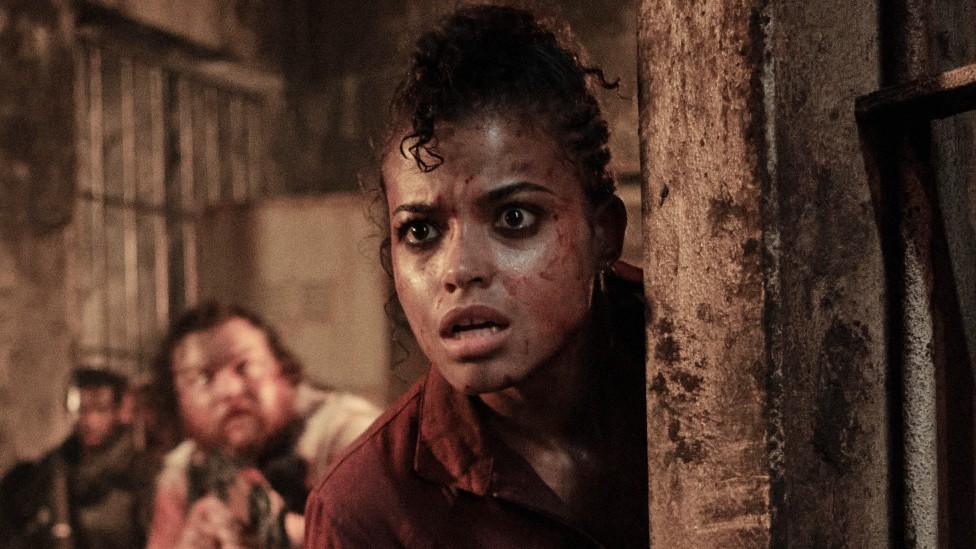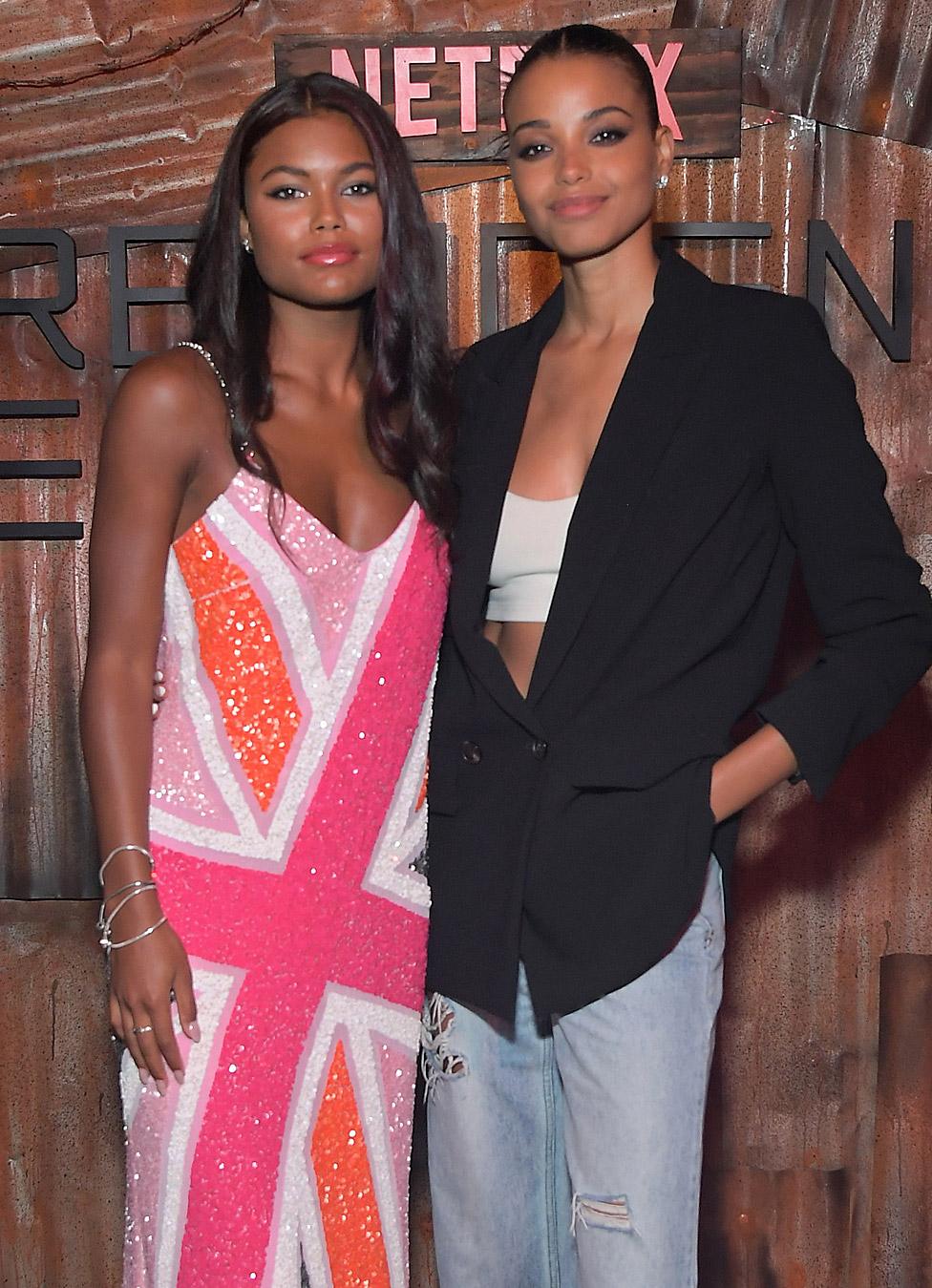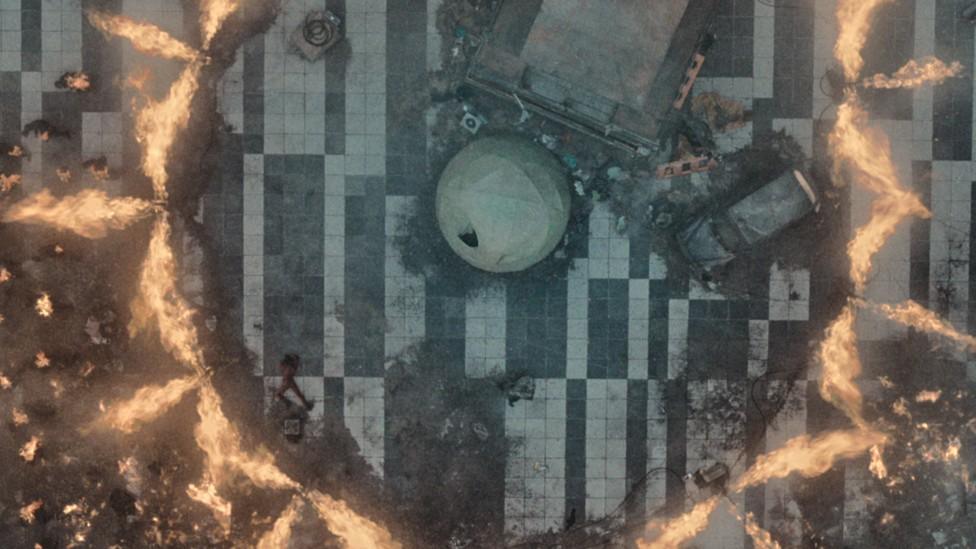Netflix's Resident Evil: 'Dead impressive' or 'a shonky adaptation'?
- Published

Resident Evil stars Ella Balinska as the adult Jade Wesker
Netflix's new Resident Evil series has divided critics, with one saying it's "the best adaptation of the zombie franchise yet" but another calling it "a biohazard that should be avoided".
It's the newest entry in the long-running video game franchise, providing the latest chapter in the story of the sinister Umbrella Corporation.
Part is set in 2036, when the world is overrun by bloodthirsty creatures.
The Telegraph's review said "the vibe is Euphoria meets the Stepford Wives".
British actresses Tamara Smart and Ella Balinska play the teenage and adult versions of Jade Wesker, before and after Umbrella's launch of the Joy antidepressant pill, secretly developed off the back of the T-virus programme.

Tamara Smart (left) wore a union jack-inspired dress as she joined Ella Balinska at the premiere in Los Angeles on Monday
In his four-star review, Ed Power from The Telegraph, external described the show, which is released on Thursday, as "riotously ridiculous" and "great fun for those who like to switch off their grey matter before parking on the couch".
"The production values for Racoon City are more Hollyoaks than HBO," he wrote. "And yet the CGI zombies are wonderfully abominable and the pace cranks up a gear whenever they lumber into view.
"Low-key political commentary has meanwhile been smuggled into sequences in which the citizens of a crumbling UK try to flee across the Channel to the promised land of Calais.
"Don't worry - you can ignore that. Resident Evil is a zombie caper that knows what it's here for. And that is to fill the screen with rampaging hordes of undead and to reassure horror fans that there is life after The Walking Dead. Those boxes are ticked in dead impressive fashion."

Resident Evil is now an explosive Netflix series, as well as a computer game and film franchise
Following the success of the original 1996 game, known as Biohazard in Japan, six live-action films starring Milla Jovovich were released between 2002 and 2016. They have grossed more than $1bn (£839m).
Chris Hayner from GameSpot , externalsaid the first live-action TV series, which plays out in two separate years - 2022, before the zombie-infested apocalypse, and 2036, after it - is "easily the best adaptation of the zombie franchise yet" because "Netflix's take feels more at home in the video game world".
He wrote: "Its storytelling approach of unfolding the plot at two separate points in time over a decade apart keeps things unique and engaging, while tracking the characters through an impending apocalypse in hopeful future seasons should be thrilling to watch - provided Netflix doesn't cancel the show as it has a number of other high-profile series (anyone else remember Cowboy Bebop?)."
The Independent's Nick Hilton, external was less impressed, offering two stars for "a muddled, shonky adaptation of the zombie video game that we didn't need", with zombies that "look like a flash mob of A-level drama students".
'Bury a pickaxe in the franchise'
"Perhaps the makers of this show felt that escaping the video game aesthetic was enough," he wrote. "And for some it will be: in the Wesker origin story and the skull-crunching violence, there's something to appeal to devotees of the landmark franchise.
"But for those unfamiliar with the fabled video game series, this will feel like little more than a muddled, and somewhat tacky, zombie serial, saddled with the baggage of pre-existing lore."
Tom Phillip from AV Club, external agreed that the show "fails to breathe new life into a franchise that won't die".
"The original 1996 game is credited for the re-emergence of zombies as a major pop-cultural force, but that wore out its welcome again a decade ago," he wrote. "Netflix's Resident Evil is proof it's time to bury a pickaxe in the franchise."
And Ross Bonaime from Collider, external punned that the series was "a biohazard that should be avoided", adding: "Resident Evil as a universe has such a rich history, with decades worth of characters, stories, and mysteries to dive into.
"Netflix's Resident Evil does its best to integrate these into a more expansive series but flounders under poor execution, awkward performances, and fan service that rarely works."
Related topics
- Published15 June 2022

- Published2 November 2021

- Published8 June 2021
